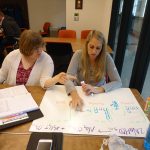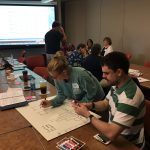Online Distance Learning
Secondary-level chemistry teachers will participate in 45 hours of on-line training in Chemistry: Modeling Instruction. The course will focus on an evidence-based approach to the internal structure of the atom; periodicity and covalent bonding; intermolecular forces; equilibrium; and acids and bases. The goal of this Modeling Methods course is to provide a meaningful form of professional development for in-service teachers using student-centered, inquiry-based, constructivist practices. Participants will frequently be asked to play two roles (student and teacher).
First, outside of class meetings, participants will be asked to take the role of a novice student in chemistry (similar to their actual students) as they perform all the laboratory investigations and problem-solving that such students will be asked to do. A taxonomy of common preconceptions and misconceptions students hold will give participants a useful perspective from which they will be better able to address their own student’s learning obstacles.
Second, participants will be asked to play the role of the classroom chemistry teacher where they will observe and discuss the techniques of managing student discourse, using Socratic dialogue, and general classroom management in an inquiry-based classroom. Throughout the course, teachers are asked to reflect on their practice and how they might apply the techniques they have learned in the course to their own classes. The principles learned here can be readily transferred to any other sort of classroom instruction.
Brenda Royce has her B.A. in Chemistry from California State University, Fresno and M.A. in Education from Fresno Pacific University. She has taught high school chemistry and physics for 22 years after a 14-year career as an environmental analytical chemist and research assistant. She has been using Modeling Instruction in her classes since 1998. Brenda has conducted numerous teacher training workshops in the practices of Modeling Instruction since 2000 in California, Arizona, Texas, and Pennsylvania as well as made presentations about Modeling Instruction at NSTA, WRNC, ChemEd, and BCCE conferences. She has been one of lead contributors to the curriculum materials used in Modeling Instruction in chemistry since the project began in 2004. Email brendar@csufresno.eduLarry Dukerich received his B.S. in Chemistry from Michigan State University and his Masters of Natural Science from Arizona State University. He taught high school chemistry and physics, including regular, honors and AP courses, in Michigan and Arizona for 34 years. He was a Woodrow Wilson Dreyfus Fellow in Chemistry in 1986 and a Presidential Awardee for Excellence in Science Teaching in 2000. Since 1995, he has conducted numerous summer workshops for physics and chemistry teachers as part of the Modeling Instruction Program at ASU, and later in Pennsylvania, North Carolina, Tennessee, New York City, Missouri, California and Colorado. He has also made presentations about and conducted workshops on Modeling Instruction at NSTA, ChemEd and BCCE conferences. He is one of the lead contributors to the curricular materials used in Modeling Instruction in chemistry. Email ldukerich@mac.com
The Spring Distance Learning courses will be conducted via Zoom. Each class will meet for 3 hours once a week for 15 weeks. The classes will also require an addition 3 hours of homework each week.
To pay the non-refundable $75 fee, email Wendy at:
wendy@modelinginstruction.org. Full payment or a $75 non-refundable deposit must be made by December 21st to secure your seat. You will be invoiced for the remainder to be paid in full by January 15, 2019.
Refund policy:
Workshop tuition costs and the deposit will be refunded 100% if the course is canceled.
A 50% refund be given for withdrawal from the course after January 15th until the course begins.
Once the course begins, no refund will be given.
Fees are processed in the United States.
If you would like to pay with Purchase Order (PO) from your school also email amtaexec@modelinginstruction.org for invoice creation. The PO needs to be delivered by December 21st to save a class seat. Payment for the course by check is preferred.


